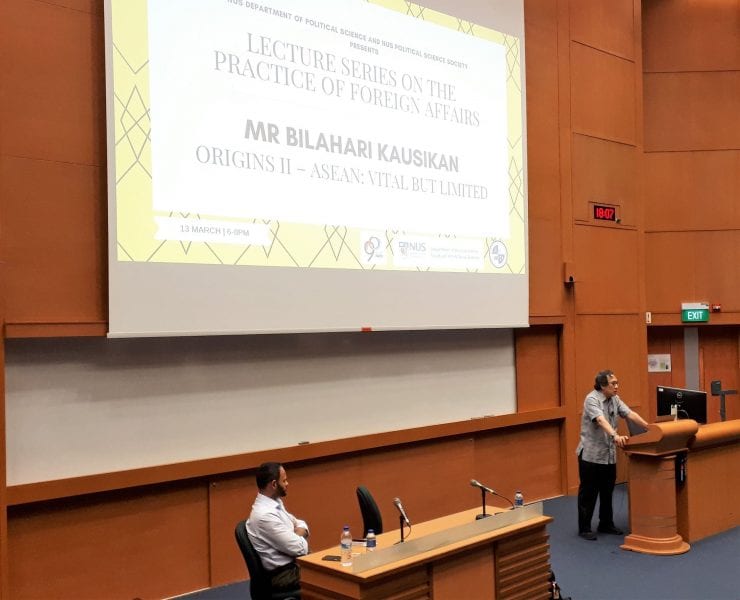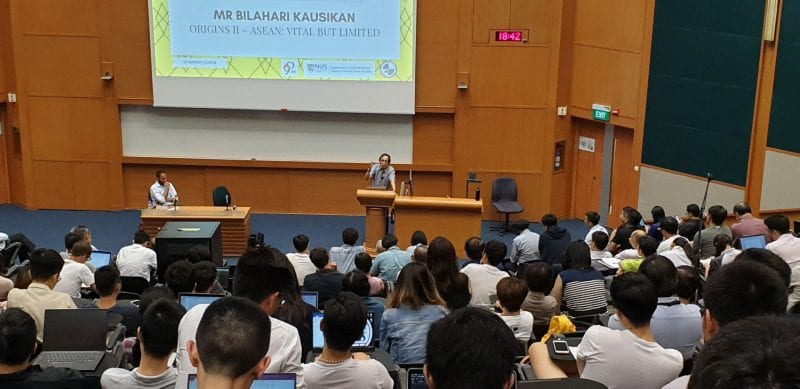Bilahari Kausikan (Arts & Social Sciences ’76) discussed the Association of South-East Asian Nations’ (ASEAN) historical and current role at his third instalment of the Practice of Foreign Policy Lecture Series at NUS on 13 March 2019.
Founding Purpose – What was Left Unsaid
ASEAN, according to Kausikan, was very much a product of the Cold War. Although the Bangkok Declaration, ASEAN’s founding document, emphasised economic cooperation, “for ASEAN’s first quarter-century, almost nothing was done to advance economic cooperation.” ASEAN’s true purpose at the time was to function as a bulwark against growing communist influence in the region, particularly after Vietnam invaded Cambodia in 1978 with Soviet Union’s support.
“There were more immediate political and security concerns, and irrespective of what the Bangkok Declaration said, these political and security concerns were ASEAN’s real concerns. Whatever our other differences, all the five founding members were anti-communist or non-communist,” he said. “The realisation was that if we did not hang together, we would hang separately.”
Despite ASEAN’s newfound unity and common purpose, it was still out of its weight class when it came to the Cambodian conflict. The Vietnam-Cambodia war was a “Sino-Soviet proxy war, and it was never in ASEAN’s power to resolve. This was a big boys’ game,” stated Kausikan. “ASEAN’s role was to rally international support to prevent a Soviet-backed Vietnamese fait accompli. And this was a limited, but not inconsequential role which we performed very successfully.”


Post-Cold War: Still Limited but Vital
With the end of the Cold War following the collapse of the Soviet Union in 1991, ASEAN found itself in need of a new purpose. What was ASEAN to do now that communism was no longer a threat?
“The answer to that,” Kausikan said, “was to try and do what we had always said was our purpose: economic cooperation.” In 1992, the ASEAN Free Trade Area (AFTA) was set up and the first phase of economic integration was “completed as scheduled by the end of 2015.” That economic integration however, did not come easy, particularly because “it was difficult to muster the will to take the political decisions that economic cooperation required without the existential challenges of the Cold War as a spur.”
Consensus and Non-Interference: Stability, Even at the Cost of Efficiency
Much of this was due to ASEAN’s “most fundamental consideration”, which is “to preserve the organisation, even if it means inaction or consensus only of form.” This meant that unless all member states agreed, ASEAN would choose the safe option and take no action. In a region with such vast differences in government styles and culture coupled with wildly diverging national interests, achieving unanimous consensus can be complicated and difficult even in the best of times.
While Kausikan admitted that consensus-based decision making often produced “sub-optimal outcomes,” he was adamant that “despite their obvious limitations, consensus and non-interference cannot be abandoned as ASEAN’s core operating principles.” Maintaining consensus amongst all ASEAN members remains paramount because “all the differences that have made regionalism so necessary and so hard to achieve have not disappeared, and will never disappear. They therefore have to be managed, if the peace is to be kept.” Using any other mode of decision-making “risks even small differences escalating into serious conflicts.”
ASEAN and the South China Sea Disputes
With four ASEAN member states currently locked in territorial disputes with China in the South China Sea, questions from the audience naturally gravitated the position ASEAN ought to take. When asked, Kausikan dismissed the idea of ASEAN playing a larger role in collectively engaging China on territorial disputes.
“We (ASEAN) discuss the South China Sea collectively with China, but we can only do that on issues that are actually secondary or tangential to the core issue, which are the competing claims,” he stated. “Territorial disputes can by definition only be settled by the parties to the dispute,” which are primarily bilateral.
In fact, Mr Kausikan contends that “it is beyond ASEAN’s capabilities to resolve the disputes in the South China Sea” since it has become “something of a proxy for the contest between the American and Chinese ideas of regionalism.”
“As with the Cambodian issue in the 1980’s, this is a big boys’ game.”
The best thing ASEAN can do now regarding the South China Sea according to him, is to “make our red lines clear to both sides” and once again play a limited, but vital role in keeping the peace in the region.
Most importantly, he added, “there are things that ASEAN can do very well and we do them, there are things we can only do sub-optimally, and there are things that are simply beyond our powers. And the art of ASEAN diplomacy is to know which is which.”
Watch the lecture here.

—-
About the Speaker
Bilahari Kausikan is Chairman of the Middle East Institute, NUS. From 2001 to 2013, he was first the second Permanent Secretary and then Permanent Secretary of the Ministry of Foreign Affairs (MFA). He was subsequently Ambassador-at-Large until May 2018, having previously served in various MFA appointments, including as the Deputy Secretary for Southeast Asia, the Permanent Representative to the United Nations in New York and as Ambassador to the Russian Federation.
FASS90 Political Science Lecture Series on the Practice of Foreign Affairs
This five part lecture series is organised by the NUS Political Science Society with support from the Faculty of Arts and Social Sciences (FASS) and the Department of Political Science. Established in 1929, FASS, one of the earliest and largest faculties is celebrating its 90th anniversary this year. Whilst witnessing numerous changes, we remain steadfast to our vision to strive forward as a premier faculty of excellence in humanities and social sciences that nurtures tomorrow’s engaged, thoughtful and creative global citizens. To mark this occasion, the Faculty is organising a series of events showcasing the strength and breadth of the Faculty’s research as well as kick start future initiatives that would benefit the generations of students who will come through our halls.